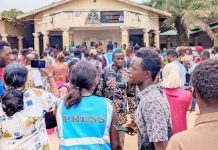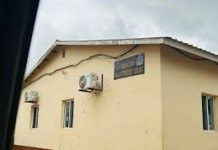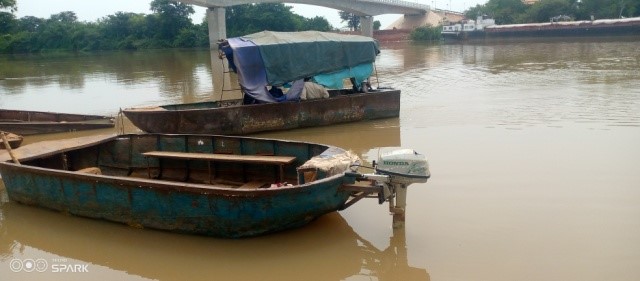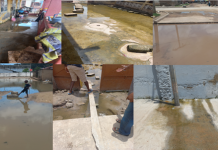By Lamin Fatty
Kolly Jallow is a leader of boatmen at Kerewan Badala crossing point in the Upper River Region (URR). He is among dozens of boatmen and vendors at the aforesaid crossing point who are in dilemma as President Adama Barrow inaugurated the Basse Wulli Bridge dubbed the Samba Juma Bridge on Saturday 9th October 2021.
The boatmen have until now been involved in the crossing of people and goods from one end to another to make ends meet. For years, these people have made great service in transporting people and goods to complement the services of Gambia Ports Authority and in so doing, they took care of their needs and their families’ affairs.
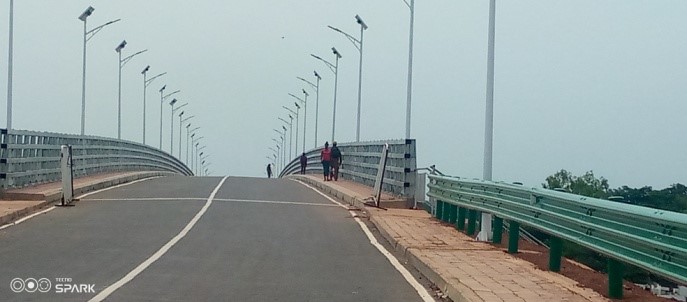
The new bridge is an infrastructure development meant to improve easy movement of people, goods and services in and out of the country.
“We are about 100 youths working as boatmen at this particular crossing point where every day, one at least earns D800 to D1000, after closing from work,” Kolly Jallow told Foroyaa. “If that all has to stop, it will leave us in a dilemma.”
Speaking further, Jallow said they have nothing else to rely on as far as managing their families’ affairs is concerned. He thus called on the government to come to their aid by remembering and considering them in their assistance in any form of assistance.
“Some of us inherited this work from our parents. We were born to find that our parents used this river crossing point for survival and feed from the little they earned and now we took over from them,” he said.
Ansumana Camara and Alieu J Sowe are boatmen enduring similar concerns. Both said they should be remembered because they have contributed a lot in the transportation of people and goods and services across the river over decades from which we also earned our living
Wuyeh Sillah, a youth leader in Kerewan Badala, welcomed the positive impact the new bridge will bring in the lives and livelihoods of the people who will use it. Sillah however shared his concern about the number of youths who risk becoming jobless. He said the construction of the bridge has made 80 to 100 youths’ jobless at the moment and they are now in a dilemma.
“And as I am talking to you right now, some of these youths are on the [verge of] embarking the dangerous journey to Europe which is very dangerous, risky and is not good for the country in particular,” he said.
The youth leader said the government needs to consider the youths who are “the hope of the country.” Sillah said they have written to the government through the office of the regional governor for URR but they are yet to receive a response.
“In this village, we have nothing to rely on now. Not even agriculture because access to land is the [biggest] problem we are facing in this community as all lands belong to the people of Nyakoi Kerewan. No one here can have access to even a 10 metres land without buying or lending it from the owners,” he said.
Women Vendors in Dilemma Too!
The crossing point has also served as a selling point for women vendors where they trade on fruits, vegetables, pancakes and condiments to earn a living. But the establishment of the new bridge, that connects URR North to South, has changed that status quo.
The women vendors like the young men desire to uplift the socioeconomic status of their families now hang in the balance.
The women vendors, in their quest for doing business to sustain their families, traveled 6 to 13 kilometres from Nyakoi and around Yorobawol to sell their goods.
Hawa Trawally is a vendor who sells bananas, apples, eggs, popcorn and pancakes. Speaking to this medium on behalf of her colleagues (women vendors), Trawally said before the establishment of the bridge their lives and livelihood depend on the sales they get at the crossing points.
She cited herself as an example who goes to the crossing points around 3 pm to sell her goods. By evening, when she packs her goods for home, she earns around D800 to D1000.
Trawally said people are not buying their goods because people cross to Basse directly through the bridge.
“On behalf of my fellow women I am calling on the government to remember us, at least to establish a women’s garden for us so that we can engage in gardening in order to continue supporting our families and to contribute to national development,” she said.
“Government Aware!”
URR Governor, Samba Bah, confirmed that the youths have written to his office but he said it coincided with the coming of the President in the region.
Governor Bah said as the president left, he prepared a covered letter, attached it to the letter of the concerned youths and forwarded it to the ministry of works, construction and infrastructure.
“It is true that the government is fully aware that the construction of the bridge must affect at least some people in one way or the other, especially the inhabitants of that community,” he said. “In fact, we are thinking how can these people be helped, either by creating a small market around that area where the youth and women vendors can engage and continue their businesses.”
Foroyaa will follow up the matter to see whether provision will be made for these youth and women to have a means of income.









